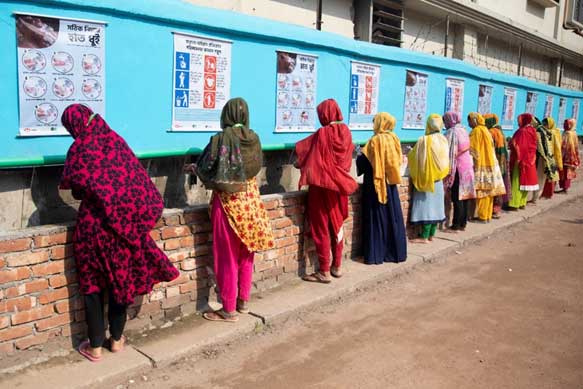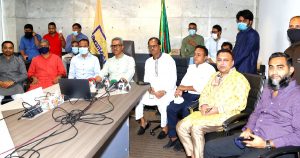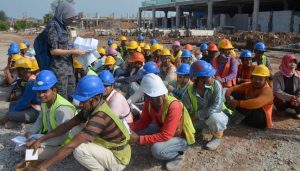A Charter of Demands written by the South Asian Regional Trade Union Council (SARTUC) has been issued.
The Charter of Demands aims to show support to the 12 Indian Trade Unions and the International Trade Union Confederation (ITUC) – Asia- Pacific’s action plan against the merger of existing 44 Indian labour laws into 4 Labour Codes.
The Charter also calls on various governments to ensure the promotion and protection of rights of workers in South Asian countries. It lists down possible actions to be taken.
The novel Coronavirus (COVID-19) outbreak has already claimed more than 1.2 million lives and more than 46 million are infected across the globe. Besides, this pandemic has also disrupted the global economy. Most governments all over the world, including South Asian Governments, have taken serious decisions to control the severity of the spread of the pandemic. These consist of the imposition of nation-wide lockdowns, shutting down borders, limiting people’s mobility, travel bans, quarantine and strict physical distancing measures, and even curfews. These situations have adversely impacted the health and socio-economic lives of the workers and brought forth uncertainties. This pandemic has had devastating effects on hundreds of millions of workers all over the world including our region where poverty and inequality is rampant. The abrupt changes in labour market due to the COVID-19 crisis has severely impacted the socio-economic lives of the workers. The millions of workers [more than 2 million in Afghanistan, 540 million in India, and around 20 million in Pakistan] are experiencing job loss, non-payment of wages, unpaid force leaves, reduced wages and deduction of government benefits. The workers particularly in the informal sectors usually do not have sick leave payment policy or health insurance and are also deprived of the government relief packages. Unemployment, poor working conditions, lack of minimum wages, exploitation of workers, lack of legal provisions and law enforcement, gender discrimination, lack of occupational safety and health in workplaces, lack of social protection of workers, etc. are the grave concerns of trade unions during and after the COVID-19 Pandemic. The issues and concerns raised by the trade unions are not being addressed by the respective government instead the draconian anti-labour laws are passed without discussion or consultation, and coercively restricting the trade unions in the countries like Afghanistan and India. Amidst these uncertainties the governments in the region are altering the laws and policies that impact the labour. Recent developments in India is illustrative as the government is merging the existing 44 Labour Laws into 4 Labour Codes:
Code on Wages
Code on Industrial Relations
Code on Occupational Safety and Health
Code on Social Security
The implementation of the 4 codes will give the employers the right to hire and fire, relaxation in labour inspection, basically taking away the rights of workers/unions to organize strikes or take industrial actions. These labour codes have introduced fixed-term contract employment, relaxing laws to permit night work for women. Furthermore, the orders of provincial governments are withdrawn exempting industries from the application of Labour Laws and increased working hours up to 12 hours per day.
So, in this context, the Executive Board of South Asian Regional Trade Union Council (SARTUC) in its meeting on 15 October 2020 held virtually decided to Observe a Decent Work for All on 26 November 2020 coinciding with National Day of Action being organized by 12 Central Trade Union Organisations and Independent Federations of Workers against Anti-Labour Policies of Government and orporatisation and Privatisation of Defence, Railways, Petroleum, Coal and other key Public Sector Enterprises in India.
On this, we SARTUC support actions of 12 Indian Trade Unions and the International Trade Union Confederation (ITUC)/ITUC-Asia Pacific’s action plan to support Indian Workers against the merger of the existing 44 Labour Laws into 4 Labour Code and we call upon the Indian government to look into these issues.
To protect and promote the rights of workers in South Asian countries the SARTUC calls upon the respective government of region and the employers to:
Ensure decent work for all with fair income and job security for workers during and
after COVID-19 pandemic;
Ensure social security including old-age pension, free health care, and unemployment allowance;
The need-based minimum wage for informal workers should be guaranteed;
There should be the provision of maternity leave minimum of 180 days, paternity leave for the spouse, and child care leave;
Gender-based discrimination should be eliminated ensuring equal pay for equal work;
The domestic worker/home-based workers should be treated at par with other regular workers;
The working hours should not exceed 40 hours per week and the workers should be forced to work exceeding 8 hours a day;
The employers should make the payment of wages for the closure of industries, commercial establishments during the lockdown period;
There should be the reinstatement of retrenched workers due to the COVID-19 pandemic;
The government should ratify Core Convention 87 and 98 on Freedom of Association
and Right to Bargain Collectively; Convention 190 on Violence and Harassment at Work;
There should be an effective bipartite and tripartite mechanism to secure more humane and dignified conditions of work;
Develop and implement the comprehensive plans and programs for the proper rehabilitation and reintegration of migrants (both internal and international) migrant workers who had to return to their native places after losing their source of livelihoods.
Ensure the repatriation of stranded migrant workers (internal and international) who have lost jobs at state expense.
Further, SARTUC strongly urges international financial institutions, and international development agencies to:
Support the government’s plans and programs on rehabilitation and reintegration of migrant workers (internal and international) who have lost their jobs;
Support to provide vocational training and on the job, skills upgrading opportunities for the returnee migrant workers;
Associate trade unions in the implementation and monitoring of Sustainable Development Goal.8 to promote decent work and sustainable economic growth and well-paid jobs;
Facilitate the government to ratify Core Convention 87 and 98 on Freedom of Association and Right to Bargain Collectively; Convention 190 on Violence and Harassment at Work;
There should be an effective bipartite and tripartite mechanism to secure more humane and dignified conditions of work. – Press release




